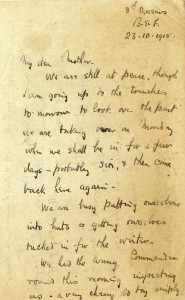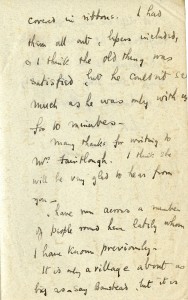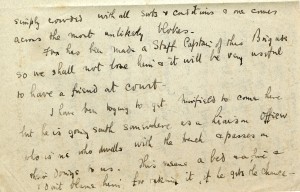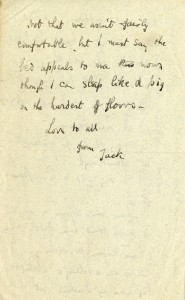Transcription
8th Queens
B. E. F.
23. 10. 1915.
My dear Mother,
We are still at peace, though I am going up to the trenches to-morrow to look over the part we are taking over on Monday when we shall be in for a few days – probably six, & then come back here again.
We are busy putting ourselves into huts & getting ourselves tucked in for the winter.
We had the Army Commander round this morning inspecting us, a very cheery old boy simply covered in ribbons. I had them all out, lepers included, & I think the old thing was satisfied but he couldn’t see much as he was only with us for 10 minutes.
Many thanks for writing to Mrs. Fairtlough. I think she will be very glad to hear from you.
I have run across a number of people round here lately whom I have known previously. It is only a village about as big as, say Banstead, but it is simply crowded with all sorts & conditions & one comes across the most unlikely blokes.
Fox has been made a Staff Captain of this Brigade so we shall not lose him & it will be very useful to have a friend at court.
I have been trying to get Mirfield to come here but he is going south somewhere as a Liaison Officer who is one who dwells with the French & passes on their doings to us. This means a bed & a fire & I don’t blame him for taking it, if he gets the chance.
Not that we aren’t fairly comfortable, but I must say the bed appeals to one [illegible] now, though I can sleep like a pig on the hardest of floors.
Love to all
from
Jack
Commentary
Part of the enjoyment of discovering ‘new’ letters is thinking about how writers tailor their correspondence to certain people and what choices they make to include and exclude certain things. It is useful to keep in mind that in all of his correspondence, Peirs is excluding most of what he sees and does during the day, summarizing things that are important or that he finds interesting (or that he thinks might be interesting to his reader) instead of dryly recording every detail of his days. In this letter, he has little to report on what his men have been doing. They had been out of the line for a few days and were training new drafts (replacements) of men who had just come from England. For Peirs, it was likely dull work.
The letter hints that he was looking forward to moving up the line again, especially since things were rather quiet. Notably, the battalion had a visit from their commanding general, likely Sir Sir Douglas Haig, though the battalion war diary is mum on both the inspection and which general came to visit.
I had them all out, lepers included, & I think the old thing was satisfied but he couldn’t see much as he was only with us for 10 minutes.
Peirs refers to his commander as a ‘cheery old boy’ and ‘old thing’ and he is lighthearted, rather than reverential towards not only his military superiors, but the function of the inspection. Every day that he is at the front he is learning more about military politics and the way the army works. In this light, he is very happy to have a friend on brigade staff, or as he calls it, ‘a friend at court’ who could advocate on his battalion’s behalf with their brigadier if necessary.




